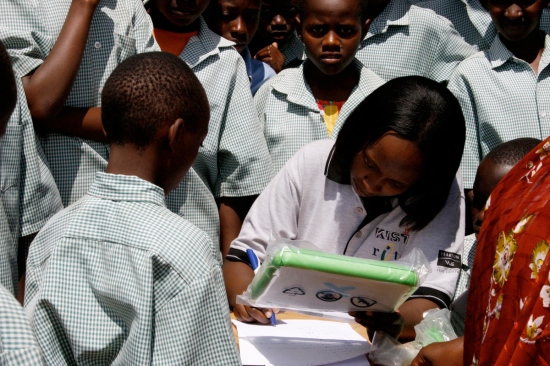
In reading Nick Wadham's article "How classroom laptops may help to boost Rwanda's economy", I noticed that educators in Rwanda are not allowing students to take their XO laptops home for two simple reasons:
Who Pays for Lost XO Laptops?
Even if OLPC promotes the idea that XO laptops are to be the children's property, that's not how most educational administrators think about any resource distributed by schools. They consider laptops like textbooks, property of the school and teachers or parents are responsible for each one. Just listen to Nick's observation:
After watching schoolchildren composing music and playing games with their laptops, I stepped out into a courtyard and saw the school principal, Françoise Murekeyisoni, in a heated argument with the mother of Valentine Mutoni, who stood looking stricken next to her. Valentine had lost her laptop several days before, but the family had only told her teachers now.
"Now it's Tuesday. Why didn't you tell me about what happened when the laptop got lost on Friday?" Murekeyisoni asked Valentine, and then turned to me. "This is my responsibility. Taking care of these kids means I have to take care of the property at school."
The government knows that computers will get lost or stolen, but officials still have not made clear who will be responsible for replacing them, a big problem where the laptop's value is half a year's wages for most Rwandans. Murekeyisoni herself has tracked down people who bought laptops from kids for a few dollars and bought them back.
XO Laptops Disrupt Family Life
How many times have you seen a child too engrossed in video games to listen to a parent or do homework or housework? I know in my house, an iPad is more exciting than food for Hanalei. So in Rwanda, Nick found that parents who need children to do daily chores ban XO's in the home:
Murekeyisoni, who is nonetheless a fervent proponent of the laptops, told me there was a second reason for keeping the laptops at school: parents didn't want them around the house. Some complained their children were entranced by the computers and did nothing but tinker with them.
"These children are still young and they are excited. They love laptops very much, beyond anything else. The parents find the laptops are becoming an obsession. The kids don't take time to eat, they stay up late and it becomes a distraction from their chores."
Local Culture Matters Most
Both of these reasons can be traced back to local culture. Where teachers and administrators are personally responsible for school items, they'll be very reluctant to have children take computers home. And where children are essential workers in family life, there is little time to "goof off" with an XO.
Good luck to OLPC to change either practice, no matter how shiny and flashy the technology.


Hi Wayan,
Thanks for the interesting post.
While I don't have first hand knowledge of what is happening in Rwanda, the situation that you (and/or Nick) describe here is not just an issue for OLPC XO roll-outs in Rwanda -- it consistent with almost *any* roll-out of portable computing technology for students and teachers.
In most cases, dealing with this turns out to be 'non-trivial', to adopt a favored term from Silicon Valley.
Who owns a laptop, who pays for repair, who 'gets punished' when something breaks ... these may seem like small 'implementation details' to some, but in reality they can profoundly affect how and where (and how often and for what purpose) such devices are used.
A common -- and regrettable -- consequence of a lack of clear direction and leadership on this issue in many places is that the use of computers is restricted to school computer labs or libraries (which of course defeats part of the purpose of adopting a 'mobile' or 'portable' device in the first place). Or in some places, this has meant that they are not used *at all*.
This isn't only a challenge for devices meant for students. It has proven to be an especially vexing challenge for programs that have provided laptops for teachers -- especially in places where the cost of replacing a laptop could represent a very large percentage of a teacher's annual salary.
One of the many ways that the Plan Ceibal experience in Uruguay (for example) could be quite valuable to people in other places would be if the approach there to this issue received wider attention, so that other countries could have a potential model to study as they articulate and implement their own related policies and practices. Right now the most widely-studied example (to the extent that such examples are studied at all) probably comes from the Maine (USA) experience, but there are many other cases as well. That said, there are to my knowledge no well-known published examples of how this is dealt with outside of OECD countries.
Given all the monies spent on education technologies in some places, along with the thinking and commitment of a lot of very bright and passionate people who are instrumental in driving these sorts of initiatives forward, it is a shame that this sort of thing does not get more attention 'up front' in more places. It should; thanks for writing about it here.
Cheers,
Mike
Hi Wayan,
I only have experience in one school in Rwanda. In that school, laptops are distributed to children in the classroom without regard to serial number or previous user. In addition, the school has two sessions. One group of students in the morning, a second in the afternoon.
The deployment plan I saw when I was there includes having the children use the laptops at home. I don't believe there is any long term intent to limit usage to in-school.
Tony
I wonder if anybody tries teaching the parent's along with the student's Many illiterate parents may feel threatened,or excluded by what is being attempted..